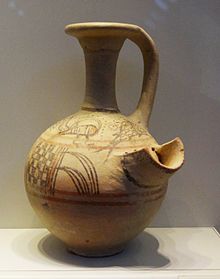
Back تاريخ الجعة Arabic Història de la cervesa Catalan Historie piva Czech Geschichte des Bieres German Historia de la cerveza Spanish Garagardoaren historia Basque تاریخ آبجو Persian Histoire de la bière French בירה במזרח הקדום HE Storia della birra Italian

Beer is one of the oldest human-produced drinks. The written history of ancient Egypt and Mesopotamia records the use of beer, and the drink has spread throughout the world; a 3,900-year-old Sumerian poem honouring Ninkasi, the patron goddess of brewing, contains the oldest surviving beer-recipe, describing the production of beer from barley bread, and in China, residue on pottery dating from around 5,000 years ago shows that beer was brewed using barley and other grains.[1]
Some say the invention of bread and beer led to the development of technology and static civilization.[2][3][4]
Beer may have been known in Neolithic Europe as far back as 5,000 years ago,[5] and was mainly brewed on a domestic scale.[6][better source needed] Beer produced before the Industrial Revolution continued to be made and sold on a domestic scale, although by the 7th century CE beer was also being produced and sold by European monasteries. During the Industrial Revolution, the production of beer moved from artisanal manufacture to industrial manufacture, and domestic manufacture ceased to be significant by the end of the 19th century.[7][page needed] The development of hydrometers and thermometers changed brewing by allowing the brewer more control of the process, and giving greater knowledge of the brewing product.
Today, the brewing industry is a global business, consisting of several dominant[citation needed] multinational companies and many thousands of smaller producers ranging from brewpubs to regional breweries.[8][failed verification] More than 133 billion liters (35 billion gallons) of beer are sold per year – producing total global revenues of $294.5 billion (£147.7 billion) in 2006.[9]
- ^ Wang, Jiajing; Liu, Li; Ball, Terry; Yu, Linjie; Li, Yuanqing; Xing, Fulai (23 May 2016). "Revealing a 5,000-y-old beer recipe in China". Proceedings of the National Academy of Sciences. 113 (23): 6444–6448. Bibcode:2016PNAS..113.6444W. doi:10.1073/pnas.1601465113. ISSN 0027-8424. PMC 4988576. PMID 27217567.
- ^ Mirsky, Steve (1 May 2007). "Ale's Well with the World". Scientific American. 296 (5): 102. Bibcode:2007SciAm.296e.102M. doi:10.1038/scientificamerican0507-102. Retrieved 4 November 2007.
'Beer is the basis of modern static civilization,' began Bamforth, Anheuser-Busch Endowed Professor of Brewing Science at the University of California, Davis. 'Because before beer was discovered, people used to wander around and follow goats from place to place. And then they realized that this grain [barley] could be grown and sprouted and made into a bread and crumbled and converted into a liquid which gave a nice, warm, cozy feeling. So gone were the days that they followed goats around. They stayed put while the grain grew and while the beer was brewed. And they made villages out of their tents. And those villages became towns, and those towns became cities. [...]'
- ^ Dornbusch, Horst (27 August 2006). "Beer: The Midwife of Civilization". Assyrian International News Agency. Retrieved 4 November 2007.
[...] as cultural beings we have not been around for more than perhaps the last 10,000 years...and, incredibly, beer-making has been around just as long, but apparently not longer! [...] Eventually the Sumerians produced more grain than they could consume themselves, either in solid or in liquid form. So they began to trade the fruits of the earth with neighboring people, mostly Semitic tribes to the north. To organize their massive collective efforts, they developed humanity's first large-scale cities, at least 7,000 years ago. The earliest carbon-dated remnants of such civilized habitations go back to between 4000 and 5000 BCE, but they probably thrived long before then. [...] We know from Sumerian records that, by the fourth millennium BCE, this industrious society of scribes, farmers, and brewers used as much as half its annual grain harvest for beer. [...] Because we consider the dawn of Sumerian culture also the dawn of man's recorded history, there is sound reason to think that beer and human civilization began at roughly the same time...and humanity hasn't stopped brewing since. If for no other reason than that beer is intimately connected with the transition of mankind from primitive to civilized society, beer has a very special place in anthropology. As is clear from the archeological evidence, man and beer have had a close and unique relationship ever since the very beginning of society, and the link has been powerful and influential.
- ^ Protz, Roger (2004). "The Complete Guide to World Beer". Archived from the original on 12 October 2016. Retrieved 30 September 2008.
When people of the ancient world realised they could make bread and beer from grain, they stopped roaming and settled down to cultivate cereals in recognisable communities.
- ^ "Prehistoric brewing: the true story". Archaeo News. 22 October 2001. Retrieved 13 September 2008.
- ^ "Beer-history". Dreher Breweries. Archived from the original on 9 July 2009.
Up until the 14th century, beer – one of natural 'euphoric drinks' of mankind – was made at home. In those days, as most household tasks, beer production was the job of women. It was like this in our country as well.
- ^ Cornell, Martyn (2003). Beer: The Story of the Pint. Headline. ISBN 0-7553-1165-5.
- ^ "Industry Browser – Consumer Non-Cyclical – Beverages (Alcoholic) – Company List". Yahoo! Finance. Retrieved 5 November 2007.
- ^ "Beer: Global Industry Guide". Research and Markets. Archived from the original on 11 October 2007. Retrieved 5 November 2007.